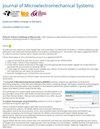A Q-factor Boost Strategy for High-Order Width-Extensional Mode MEMS Resonators by Varied Unit Length
IF 2.5
3区 工程技术
Q2 ENGINEERING, ELECTRICAL & ELECTRONIC
引用次数: 0
Abstract
It is a longstanding issue that high-order width-extensional (WE) piezoelectric microelectromechanical system (MEMS) resonators suffer low quality factors (Q-factors). In this study, it is observed that the mode distortion occurs in each unit when it couples with each other to constitute the high-order WE-mode resonator, leading to a decreased Q-factor. Based on this finding, we propose a new Q-factor boost strategy by improving mode matching degree between adjacent units from the view of dividing the high-order resonator into units. Both simulation and experimental results show a significant improvement in mode matching degree between adjacent units with varied unit length. Resonator’s Q-factor measured in air improved by 53% compared with the conventional resonator with constant unit length. It is believed that the proposed strategy could apply to other WE-mode MEMS resonators with different orders or dimensions; and Q-factor can be further improved by combining the proposed method with traditional energy reflection methods. [2023-0201]JMEMS Letters.1pt 采用不同单位长度的高阶宽度扩展模式 MEMS 谐振器的 Q 因子提升策略
长期以来,高阶宽度扩展(WE)压电微机电系统(MEMS)谐振器的品质因数(Q 因子)较低。在本研究中,我们观察到每个单元在相互耦合构成高阶 WE 模式谐振器时都会发生模式畸变,从而导致 Q 因子降低。基于这一发现,我们提出了一种新的 Q 因子提升策略,即从将高阶谐振器划分为若干单元的角度出发,提高相邻单元之间的模式匹配度。仿真和实验结果都表明,随着单元长度的变化,相邻单元之间的模式匹配度得到了显著改善。与单位长度不变的传统谐振器相比,在空气中测量的谐振器 Q 因子提高了 53%。相信所提出的策略可适用于其他不同阶数或尺寸的 WE 模式 MEMS 谐振器;通过将所提出的方法与传统的能量反射方法相结合,可进一步提高 Q 因子。[2023-0201]
本文章由计算机程序翻译,如有差异,请以英文原文为准。
求助全文
约1分钟内获得全文
求助全文
来源期刊

Journal of Microelectromechanical Systems
工程技术-工程:电子与电气
CiteScore
6.20
自引率
7.40%
发文量
115
审稿时长
7.5 months
期刊介绍:
The topics of interest include, but are not limited to: devices ranging in size from microns to millimeters, IC-compatible fabrication techniques, other fabrication techniques, measurement of micro phenomena, theoretical results, new materials and designs, micro actuators, micro robots, micro batteries, bearings, wear, reliability, electrical interconnections, micro telemanipulation, and standards appropriate to MEMS. Application examples and application oriented devices in fluidics, optics, bio-medical engineering, etc., are also of central interest.
 求助内容:
求助内容: 应助结果提醒方式:
应助结果提醒方式:


